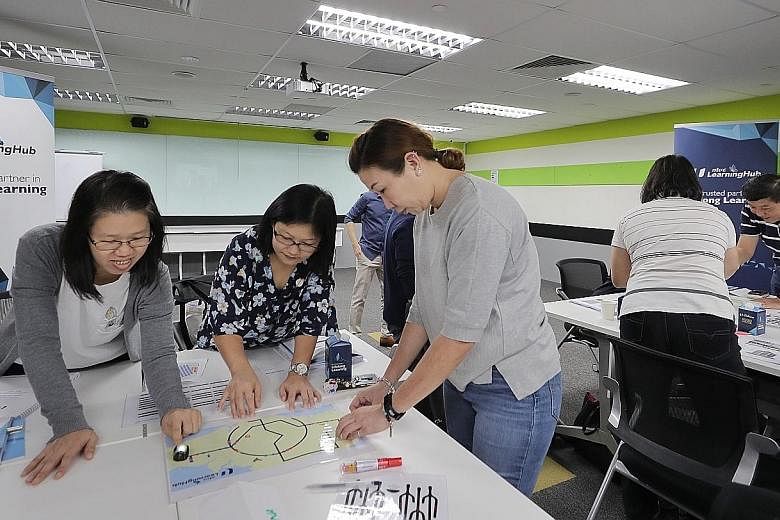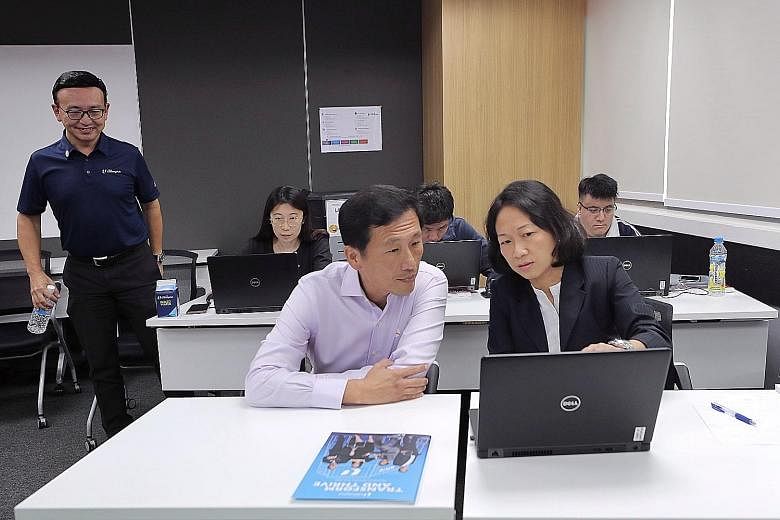More than 90 per cent of SkillsFuture credit claims that people have made are work-related, Education Minister Ong Ye Kung said yesterday, and the most popular courses are in information and communications technology.
In response to a question about helping people find courses that are more relevant for work, Mr Ong acknowledged that some older Singaporeans may use their SkillsFuture credits for lifestyle-related courses like learning a language, flower arrangement or baking.
"I also don't want to be too judgmental - what is leisure to me may be a profession to somebody else. (It) may be a home-based business for somebody else. What to me may be a language to understand a drama series may be a work requirement for somebody else," he said.
Deputy Prime Minister Heng Swee Keat announced in his Budget speech last week a one-off SkillsFuture Credit top-up of $500 for every Singaporean aged 25 years and above, and an additional $500 for those aged 40 to 60, to help them move to new jobs or new roles.
The Government had earlier given a $500 SkillsFuture credit to all Singaporeans aged 25 years and above in January 2016.
Speaking to reporters yesterday after visiting training sessions at the NTUC LearningHub in Bras Basah, Mr Ong acknowledged that individuals need more guidance to find relevant courses. "We started off with letting a thousand flowers bloom, so we have many courses, but sometimes that also causes some confusion, where an individual doesn't know where to start, or what to learn," he said, adding that the range of courses should evolve to become more targeted for workers' needs.
To that end, the SkillsFuture portal, which contains resources on industry insights, job roles and training courses, has become more personalised in its functions and users can also see how their peers have rated certain courses.
More than 100,000 Singaporeans have also attended workshops and talks under SkillsFuture Advice at community centres or clubs, to find out more about skills upgrading.
The past five to six years of work have resulted in a closer relationship between the education system and the SkillsFuture movement, said Mr Ong, and Singaporeans are also taking more ownership of their learning.
Going forward, the Government will engage anchor enterprises, or "Queen Bee" companies, that are leaders in their fields.
These firms can train not just their employees but also the wider industry, raising skill levels of the whole value chain, said Mr Ong.
Emphasising the need for retraining as the pace of technological change increases, Mr Ong said: "The deeper our skills are in various domain areas, the harder it is for technology to replace what we do.
"So (SkillsFuture) continues to be a very important way for us to stay ahead of the game, raise our competitiveness and for individual Singaporeans to stay relevant, and to be inclusive in our economic strategy."
Ms Angelia Tan, 48, is taking a three-day course on computer networking fundamentals at the NTUC LearningHub.
Besides a $15 registration fee, the course fee of $153 will be covered entirely by her SkillsFuture credit.
"The additional top-ups will be very useful. It can be tough especially for small and medium-sized enterprises (SMEs) to sponsor such courses, which can cost thousands of dollars at private training providers," said the general manager at a tech SME that specialises in security services for law enforcement.



